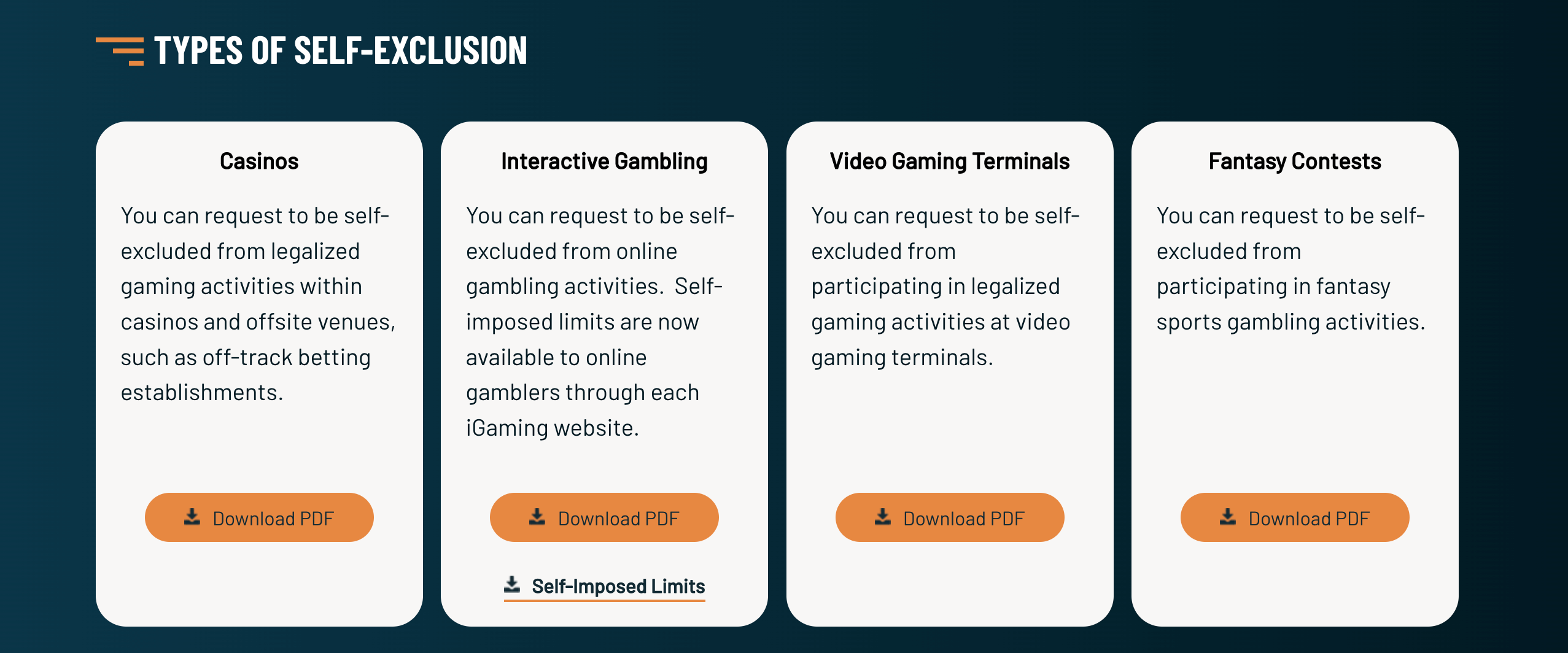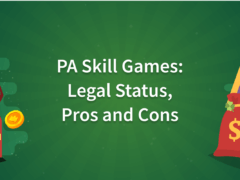Join our subscription list to get access to new bonus offers, online casino reviews, and industry news all in one newsletter!
How Casino Self-Exclusion Works in Pennsylvania

 1.4K
1.4K

The delicate but important subject of responsible gambling will always be a hot button topic. Striking a balance between personal freedom and controlling potentially harmful activity isn’t easy for any government. Nevertheless, it’s essential for regulators and operators to find a sustainable framework.
Generally speaking, most casinos and regulatory authorities in the USA have done a passable job. Studies show that the development of responsible gambling measures has led to tangible benefits. What’s more, an increasing number of players are utilizing such tools.
Voluntary self-exclusion is a particularly notable and successful example. And in this article, we’ll take a look at how this works, specifically in the state of Pennsylvania.
How Self-Exclusion Works in the US
Self-exclusion is undoubtedly a noble idea in theory. But in practice, it’s extremely hard to implement a nationwide program. The idea that casino workers as far apart as Washington, Florida and New York could somehow police each other’s excluded players is unrealistic.
However, by breaking it down to the state level, there’s a better chance of sustaining these programs. The system relies upon the individual not traveling to casino venues outside of their home state. But this is hardly unique to the USA and all voluntary self-exclusion programs face similar challenges.
One way to combat that is for the player to take action with an individual operator. So rather than opt for a self-imposed state-wide ban, you could exclude from each company, be it Caesars, DraftKings, or whoever. Each casino and betting brand runs its own internal program, with details available on their respective websites.
If you or someone you love needs help, you can speak to the National Problem Gambling Helpline on 1-800-522-4700. Alternatively, reach out to the Pennsylvania Gaming Control Board at [email protected] or 717-346-8300.
PA Gambling Self-Exclusion
Unlike other parts of the United States, Pennsylvania self-exclusion is split into five distinct parts. You can opt into the iGaming Self-Exclusion program, which specially covers PA online casinos, but not land-based venues. If you wish to ban yourself from physical casinos in the Keystone State, you’ll need to go through a second process.
There are also individual programs for the state lottery, VGTs (Video Gambling Terminals) and Fantasy Sports contests. Unfortunately, enrollment into one of the five PA gambling self-exclusion programs does not mean you’ll automatically be barred from all venues. Instead, you’ll need to sign up for each one separately.
Pennsylvania Gaming Control Board
Both casino self-exclusion schemes in PA are operated by the state’s regulator, the Pennsylvania Gaming Control Board. The PGCB website contains several useful responsible gambling resources, including how to protect yourself from harm and advice on spotting the signs of addiction. But you’ll also find a comprehensive walk-through of how to register to each PA self-exclusion list.

To voluntarily opt-out of bricks-and-mortar casinos in the state, you’ll have to visit the PGCB Harrisburg Office in person. Alternatively, you can file your application at the regional sites found in Conshohocken, Pittsburgh or Wilkes Barre.
Don’t turn up unannounced though. You’ll first need to call the Office of Compulsive and Problem Gambling on 717-346-8300 to make an appointment.
What to Expect
The registration form is comprehensive, requiring more than just the usual name, address, telephone and date of birth. Expect to hand over your Social Security Number, as well as a detailed physical description. This includes the color of your eyes, height and weight. Finally, you’ll need to supply a valid photo identification document
Options for voluntary self-exclusion periods are limited to the following:
- Minimum: One year of exclusion;
- Intermediate: A five year self-exclusion period;
- Permanent: An irreversible ban for life.
Nobody else is permitted to add you to the casino self-exclusion list; it must come from you. Once you’re on the list, you cannot reverse the decision.
PA Online Self-Exclusion
As previously mentioned, PA operates a specific online self-exclusion program for internet casinos. You can find detailed instructions on how to join on the PGCB site, but the first thing you’ll need is a Keystone Login account. Once registered, log in to enroll in the iGaming Self-Exclusion program.
Take care when completing the Keystone Login registration. Upon submitting your details, there will be a verification check. You can’t proceed until your details are validated and if you fail twice, you’ll be locked out. At that point, a call to the PGCB is required.
When you’re ready to register for iGaming Self-Exclusion, have some form of ID to hand as you’ll need to upload a copy. Registrants must also submit a photograph of themselves via their webcam or smartphone camera. It must be captured during the signup process; uploading old pictures is not allowed.
Online exclusion works in the same way as the offline program, in terms of the length of ban. Once registered, internet casinos in the Keystone State will no longer be allowed to accept your bets. But remember that an iGaming exclusion does not stop you from participating in other forms of gambling. So you’ll need to register for each opt-out separately.
How to Get Off Self-Exclusion List in PA
Like any good voluntary self-exclusion program, once your details are in the system, that’s it; there’s nothing you can do to change it. The whole purpose of such a program is to put obstacles between you and the problematic behavior, giving time to cool down.
Pennsylvania is particularly strict when it comes to enforcing self-exclusion, too. Unlike other US states, you can actually be arrested for attempting to gamble when under a self-exclusion.
If you choose a lifetime ban, it will literally remain in place permanently, with no right to appeal. However, if you plump for a one or five year opt-out, you will be able to resume gambling activities once your time is up. Unfortunately though, there is currently a disjointed approach between the online and offline programs. Here’s how it works:
- Land-based casino exclusion: Once the exclusion period has expired, you will remain blocked. A self-exclusion removal request must be sent to the PA gaming board;
- Online casino exclusion; Unlike the land-based program, online bans are automatically lifted. Your details are expunged from the system after 10 days. If you wish to extend the exclusion period, contact the gaming board prior to expiry.
What the Statistics of Self-Exclusion Look Like in the United States
With an estimated six million problem gamblers in the US, it’s little wonder that regulators are taking responsible gambling practices seriously. Self-exclusion programs may be the most extreme weapon in the fight. But online casinos supply plenty of other ammunition too, including deposit and loss limits, reality checks and time-outs.
These tools are certainly not for show and are being used across the country with great success. Some research papers show that responsible gambling measures really do result in significantly less time spent gambling. And in turn, there are positive knock-on benefits to the health and financial situations of problem gamblers.
An ever-growing number of players are self-excluding voluntarily. In Pennsylvania, the number of applications for the whole of 2021 was 2,891, almost double the 2020 figure. Although we don’t yet have complete data for 2022, there were 1,931 applicants by the end of June. With the bulk of registrations usually arriving at the end of the year, it seems the record will easily be broken.
This elicits mixed emotions. We obviously want to see people who struggle with addiction successfully improving their quality of life, so the rise is encouraging. But a less charitable interpretation of the data, from those opposed to the growth of online casinos, is that we are creating more problem gamblers.
Self-Exclusion in PA: More to be Done?
Voluntary self-exclusion programs in Pennsylvania, and indeed the USA, are clearly having a positive impact. But as the number of participants continues to grow, this also serves to illustrate the extent of the underlying problem.
It is clear that both the regulator and the many individual operators are already taking social responsibility seriously. But we only need to look to Europe to see what might happen if the number of problem gamblers continues to swell.
The UK is a notable case, implementing intrusive affordability checks, not to mention strict bans on advertising. But several governments are opting to tackle what is increasingly being perceived as a problem, with draconian measures. Casinos in the United States must learn from such examples.
FAQ
Can you self-exclude from casinos in Pennsylvania?
Yes. The Pennsylvania Gaming Control Board runs a number of different self-exclusion programs for gamblers, including online and bricks-and-mortar casinos. Find out how to add your name to the list a little further up the page.
How do I block myself from Pennsylvania casinos?
We’ve summarized the process of self-excluding from land-based and online casinos in Pennsylvania above. However, you may visit the PGCB self-exclusion page for full details.
How do I get my name off the self-exclusion program in Pennsylvania?
You can’t unless your exclusion period is over. At the end of your one year or five year ban, you must submit a request to the PA gaming board. Online exclusions are automatically lifted. However, if you chose a lifetime self-exclusion, you can never remove your name from the list.
If I am self-excluded in Pennsylvania and I gamble, what happens?
Anyone caught violating the terms of their self-exclusion could potentially receive a citation for criminal trespass. Whether playing online or off, any winnings must be forfeited, but losses will stand. It is not worth the risk, so please do not try this.
How do I send a self-exclusion removal request in PA?
First of all, the PA self-exclusion removal is only possible after the exclusion period is over. If you are sure you are ready to get back to gambling, you can call the Office of Compulsive & Problem Gambling at 717-346-8300 and start the process of removing yourself from the PA casino exclusion list.
Is self-exclusion in PA casinos permanent?
It depends on the exclusion term you choose. While it’s possible to opt for 1 or 5 year exclusion, there is also a lifetime exclusion option that will put you in the PA exclusion list permanently.
What happens if I make a bet while being self-excluded?
In most cases, your bets will just be declined. If for some reason you manage to make a bet in a PA casino, any winnings you get will be forfeited and your account will be closed. To prevent this, you might want to delete your FanDuel account or any other online casino or sportsbook account.










